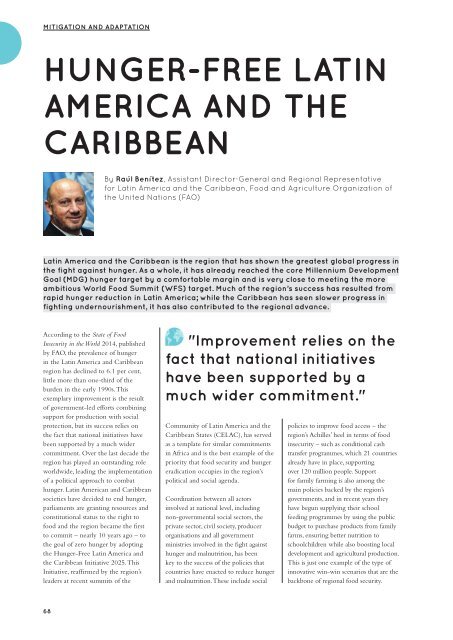Climate Action 2014-2015
You also want an ePaper? Increase the reach of your titles
YUMPU automatically turns print PDFs into web optimized ePapers that Google loves.
MITIGATION AND ADAPTATION<br />
HUNGER-FREE LATIN<br />
AMERICA AND THE<br />
CARIBBEAN<br />
By Raúl Benítez, Assistant Director-General and Regional Representative<br />
for Latin America and the Caribbean, Food and Agriculture Organization of<br />
the United Nations (FAO)<br />
Latin America and the Caribbean is the region that has shown the greatest global progress in<br />
the fight against hunger. As a whole, it has already reached the core Millennium Development<br />
Goal (MDG) hunger target by a comfortable margin and is very close to meeting the more<br />
ambitious World Food Summit (WFS) target. Much of the region’s success has resulted from<br />
rapid hunger reduction in Latin America; while the Caribbean has seen slower progress in<br />
fighting undernourishment, it has also contributed to the regional advance.<br />
According to the State of Food<br />
Insecurity in the World <strong>2014</strong>, published<br />
by FAO, the prevalence of hunger<br />
in the Latin America and Caribbean<br />
region has declined to 6.1 per cent,<br />
little more than one-third of the<br />
burden in the early 1990s. This<br />
exemplary improvement is the result<br />
of government-led efforts combining<br />
support for production with social<br />
protection, but its success relies on<br />
the fact that national initiatives have<br />
been supported by a much wider<br />
commitment. Over the last decade the<br />
region has played an outstanding role<br />
worldwide, leading the implementation<br />
of a political approach to combat<br />
hunger. Latin American and Caribbean<br />
societies have decided to end hunger,<br />
parliaments are granting resources and<br />
constitutional status to the right to<br />
food and the region became the first<br />
to commit – nearly 10 years ago – to<br />
the goal of zero hunger by adopting<br />
the Hunger-Free Latin America and<br />
the Caribbean Initiative 2025. This<br />
Initiative, reaffirmed by the region’s<br />
leaders at recent summits of the<br />
"Improvement relies on the<br />
fact that national initiatives<br />
have been supported by a<br />
much wider commitment."<br />
Community of Latin America and the<br />
Caribbean States (CELAC), has served<br />
as a template for similar commitments<br />
in Africa and is the best example of the<br />
priority that food security and hunger<br />
eradication occupies in the region’s<br />
political and social agenda.<br />
Coordination between all actors<br />
involved at national level, including<br />
non-governmental social sectors, the<br />
private sector, civil society, producer<br />
organisations and all government<br />
ministries involved in the fight against<br />
hunger and malnutrition, has been<br />
key to the success of the policies that<br />
countries have enacted to reduce hunger<br />
and malnutrition. These include social<br />
policies to improve food access – the<br />
region’s Achilles’ heel in terms of food<br />
insecurity – such as conditional cash<br />
transfer programmes, which 21 countries<br />
already have in place, supporting<br />
over 120 million people. Support<br />
for family farming is also among the<br />
main policies backed by the region’s<br />
governments, and in recent years they<br />
have begun supplying their school<br />
feeding programmes by using the public<br />
budget to purchase products from family<br />
farms, ensuring better nutrition to<br />
schoolchildren while also boosting local<br />
development and agricultural production.<br />
This is just one example of the type of<br />
innovative win-win scenarios that are the<br />
backbone of regional food security.<br />
68












